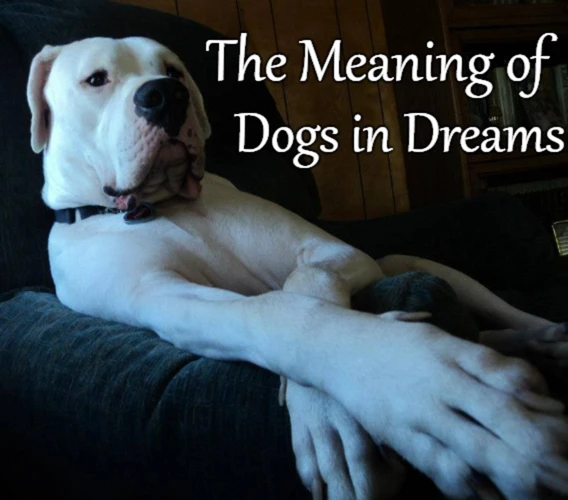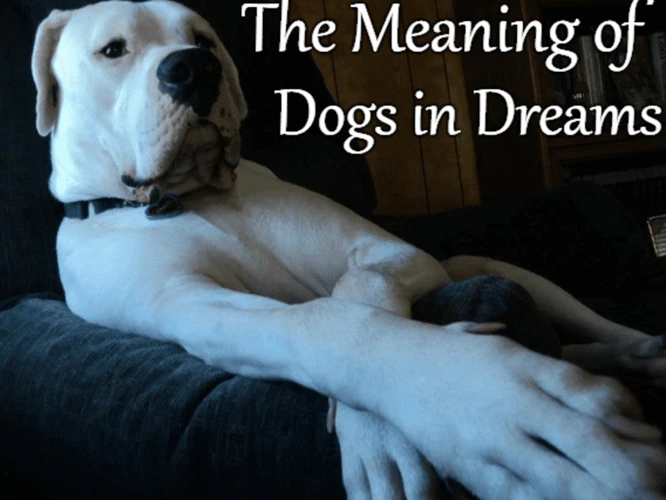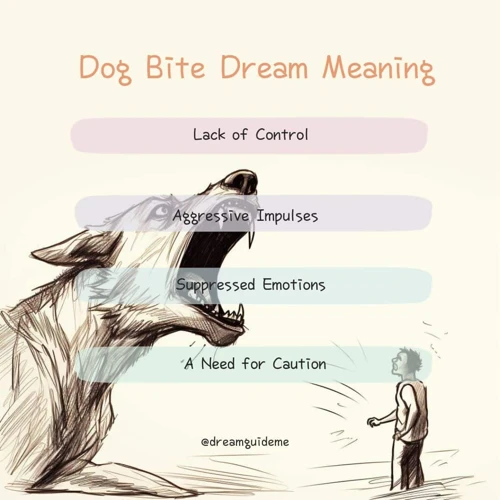Unveiling the Mysterious Interpretation of Canine Dreams: What Do Dogs Dream About When They Have Nightmares?

Have you ever wondered what goes on in the mind of your beloved furry friend when they drift off into dreamland? Dogs have captivated us with their boundless energy, loyalty, and playful spirit. But what happens when they have nightmares? As devoted pet owners, it is natural for us to be curious about what they could possibly be dreaming about during those restless nights. In this article, we will delve into the fascinating world of canine dreams and explore the science behind them. By uncovering common nightmares in dogs and understanding how to interpret their dreams, we can provide comfort and support to our canine companions when they need it most.
The Science Behind Canine Dreams

Dogs, like humans, have a complex brain that allows them to experience dreams during their sleep. Research has shown that dogs enter a state of rapid eye movement (REM) sleep, which is associated with dreaming, just like humans. During this stage, their brains become highly active, and their bodies may twitch, whimper, or move as if they are acting out their dreams. Studies have also discovered that dogs’ dream patterns resemble their waking experiences. For example, a dog who loves to fetch may dream about chasing a ball, while a dog who enjoys swimming may dream about splashing in the water. This suggests that their dreams are influenced by their daily activities and experiences. Additionally, scientists believe that dogs may also process and consolidate memories while they dream, just as humans do. Understanding the science behind canine dreams provides us with a fascinating glimpse into the inner workings of our furry friends’ minds.
Common Nightmares in Dogs

Nightmares can be distressing for dogs, just as they are for humans. Understanding the common types of nightmares that dogs experience can help us identify and address their emotional and physical needs. Fear and anxiety-related nightmares are one of the most prevalent types. Dogs may have nightmares about being chased, attacked, or abandoned, reflecting their anxieties and fears in real life. Memory replay nightmares are another common occurrence, where dogs may relive traumatic experiences, such as accidents, abuse, or being separated from loved ones. These nightmares can be indicators of unresolved past traumas. Additionally, dogs may have physical discomfort nightmares related to illness, pain, or discomfort they may be experiencing. Providing a safe and comforting environment, along with appropriate veterinary care, can alleviate these nightmares and promote a sense of security for our furry companions.
Fear and Anxiety-related Nightmares
Just like humans, dogs can experience fear and anxiety in their dreams. Nightmares related to fear and anxiety may manifest in various ways. Dogs may exhibit behaviors such as whimpering, growling, or even barking while they sleep. These nightmares could be triggered by traumatic experiences, phobias, or stressful situations they have encountered in their waking life. For example, a dog that has been through a thunderstorm may have nightmares about loud noises and lightning. It is essential for pet owners to provide a safe and secure environment for their dogs, as well as work on desensitization techniques to help alleviate their anxiety. Identifying the underlying cause of fear and anxiety in dogs can go a long way in helping them overcome their nightmares and find peace during their sleep.
Memory Replay Nightmares
Memory Replay Nightmares: Dogs, much like humans, have the ability to replay memories while they dream. It is believed that during the REM stage of sleep, dogs may experience vivid dreams that involve reliving past events and experiences. This can include activities they enjoy, such as playing fetch or going for a walk, or even frightening or traumatic experiences they have encountered. These memory replay nightmares can be triggered by various factors, such as recent events, changes in their environment, or exposure to stressful situations. It’s important to remember that dogs may exhibit signs of distress or anxiety during these nightmares, such as whimpering, growling, or excessive movement. Providing a comforting environment and reassurance can help alleviate their fear and anxiety. If you notice your dog having frequent memory replay nightmares, it may be beneficial to consult with a veterinarian or animal behaviorist for further guidance and support.
Physical Discomfort Nightmares
Dogs, just like humans, can have nightmares related to physical discomfort. These nightmares may occur when a dog is experiencing pain, illness, or discomfort in their body. It could be a result of an injury, digestive issues, or even an underlying medical condition.
During these nightmares, a dog may exhibit signs of distress such as whining, whimpering, or restless movements. They may also exhibit physical symptoms like panting, drooling, or attempting to relieve their discomfort by scratching or licking a specific body part.
If you notice your dog having recurring nightmares associated with physical discomfort, it is crucial to consult with a veterinarian to rule out any underlying health issues. By addressing and treating the physical discomfort, you can help alleviate your dog’s nightmares and improve their overall well-being.
Understanding Canine Dream Interpretation

Interpreting canine dreams can be quite challenging since we can’t directly ask our furry friends about their dream experiences. However, by observing their behavior and taking note of their daily activities, we can make educated guesses about the content of their dreams. For example, if a dog frequently engages in rough play during the day, they may have dreams that involve playful interactions with other dogs or even humans. Similarly, if a dog has experienced a traumatic event, such as being attacked by another animal, they may have nightmares related to that specific incident. It’s important to remember that each dog is unique, and their dream interpretation may vary based on their individual personality and experiences. By paying attention to their behaviors, responses, and any signs of distress during sleep, we can gain valuable insights into our canine companion’s dream world and better support them in their journey towards a peaceful night’s sleep.
Tips to Help Dogs with Nightmares
If your furry friend is experiencing nightmares, there are several tips you can follow to help them feel secure and comfortable during their sleep. First, create a calming and soothing bedtime routine by providing a peaceful environment for them to rest. This can include dimming the lights, playing soft music, or using aromatherapy with calming scents like lavender. Additionally, you can try using a cozy and supportive bed to promote a sense of security. Another effective tip is to engage in relaxation techniques such as gentle massage or using a weighted blanket, which can help reduce anxiety and promote deeper sleep. It’s also important to provide regular exercise and mental stimulation throughout the day to help alleviate any pent-up energy or stress that may contribute to nightmares. Lastly, if your dog’s nightmares persist or seem to be causing significant distress, it’s always a good idea to consult with a veterinarian or a professional dog behaviorist for further guidance and support.
Conclusion
In conclusion, the world of canine dreams remains a fascinating and mysterious realm that offers insight into the inner workings of our beloved furry companions. The science behind canine dreams reveals that dogs experience dreams during their sleep, similar to humans, with their dream patterns often reflecting their daily activities and experiences. By understanding the common nightmares in dogs and interpreting their dreams, we can better support and comfort them when they have restless nights. Remember to provide a peaceful sleep environment and reassure your dog during times of distress. With our love and understanding, we can help ensure that our dogs have pleasant dreams and wake up to a new day full of joy and happiness.
Frequently Asked Questions
Do dogs really dream?
Yes, dogs do dream. Their brain activity during sleep resembles that of humans during dreaming, and they may even act out their dreams with movements and sounds.
Can dogs have nightmares?
Yes, dogs can have nightmares. Just like us, they can experience dreams that evoke fear, anxiety, or discomfort.
What do dogs dream about?
We can’t be certain about the content of dogs’ dreams, but research suggests that their dreams are often related to their daily experiences, activities, and memories.
How can I tell if my dog is having a nightmare?
Pay attention to your dog’s behavior during sleep. If they are whining, whimpering, or showing signs of distress like shaking or rapid breathing, they may be having a nightmare.
Is it normal for my dog to move or twitch while dreaming?
Yes, it is normal for dogs to twitch, paddle their paws, or exhibit small movements during dreaming. This is their way of acting out their dreams.
Should I wake up my dog if they are having a nightmare?
It is generally best not to wake up a dog experiencing a nightmare, as it may startle them and prolong their distress. Instead, try gently comforting them once they wake up.
Can I do anything to prevent my dog from having nightmares?
While you can’t completely prevent your dog from having nightmares, providing them with a safe and comfortable environment, regular exercise, and positive experiences can help reduce their likelihood.
Should I be concerned if my dog has frequent nightmares?
If your dog frequently has nightmares that significantly disrupt their sleep or cause distress, it may be worth consulting with a veterinarian to rule out any underlying health or behavioral issues.
Can I help my dog interpret their dreams?
Unfortunately, we can’t directly interpret our dogs’ dreams. However, by observing their daily activities and behavior, we can gain insights into what types of dreams they may be having.
Are there any treatments for dogs with recurring nightmares?
If your dog experiences recurring nightmares that significantly affect their well-being, a veterinary behaviorist may be able to provide guidance and recommend appropriate treatments such as behavior modification or medication if necessary.







